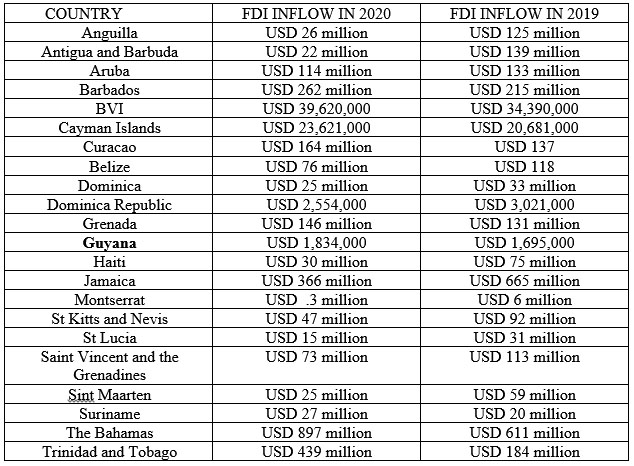Guyana’s successive world class oil finds beginning back in May 2015 have propelled the country to the top of the list of Foreign Direct Investment recipients across the entire Caribbean Community (CARICOM) last year and second behind the Dominican Republic across the Caribbean and Latin America as a whole, according to a recently released assessment of FDI inflows into the region released earlier this month by the United Nations Conference on Trade and Development. (UNCTAD). Guyana’s receipts for last year amounted to US$1.834 billion, exceeding the US$1.695 billion received last year. The country’s 2020 FDI investment inflows far exceeded FDI receipts across the entire Caribbean Community (CARICOM).
The revelation in the UNCTAD report is a manifestation of the level of foreign investor interest from which Guyana has benefited since news of the country’s first ever “world class” oil find broke back in May of 2015. In 2019, Foreign Direct Investment in Guyana totaled US$1.695 billion.
Here’s how the Caribbean made out in FDI inflows in 2020 compared to 2019.
By comparison the remainder of the CARICOM countries did not fare nearly as well in terms as direct investments from abroad. The Bahamas, the second highest FDI investment recipient among CARICOM countries last year was the recipient of US$897 million last year, an amount representing an increase over the US$665 million which the country attracted in 2019. Trinidad and Tobago, long the recipient of major FDI inflows in previous years on account of its oil and gas sector secured US$439 million last year compared with US$184 million in 2019 while Jamaica benefitted from US$344 million last year, a reduction on the US$665 million which it received in 2019. Barbados, attracted US$362 million in Foreign Direct Investment last year compared with US$215 million in 2019.
UNCTAD’s findings indicate that the outbreak and rapid spread of the pandemic and what, in many instances, were the devastating effects of the onslaught on some economies did not prevent an inflow of close to US$70 billion from finding its way into countries in the region. That amount, the report said, topped inflows for the preceding year by at least US$8 billion.
On the whole, however, the report says that the Caribbean had a poor year insofar as foreign direct investment was concerned, citing the collapse of tourism resulting from the COVID-19 strictures and the consequential drying up of investment in the travel and leisure industry resulting from the pandemic as the key factors resulting in the curtailing of FDI inflows. According to the report, the Dominican Republic, customarily a major regional recipient of FDI inflows suffered a 15% decline while inflows to Haiti reduced from US$75 million to US$30 million, a circumstance which the report said was due not only to the pandemic but also to civil unrest in the country as well as what it says is the worsening of the country’s ongoing humanitarian crisis.
Going forward, the report says, the situation insofar as foreign direct investment in the region is concerned is unlikely to improve before 2023, its projection being that this year real Gross Domestic Product (GDP) is forecast at 3.7%.
Sluggish FDI inflows into the region, the UNCTAD report says, reflected a microcosm of a global problem with inflows falling by one third to US$1 trillion, a level which it says, was well below the low point reached in the wake of the global financial crisis of a decade ago.





